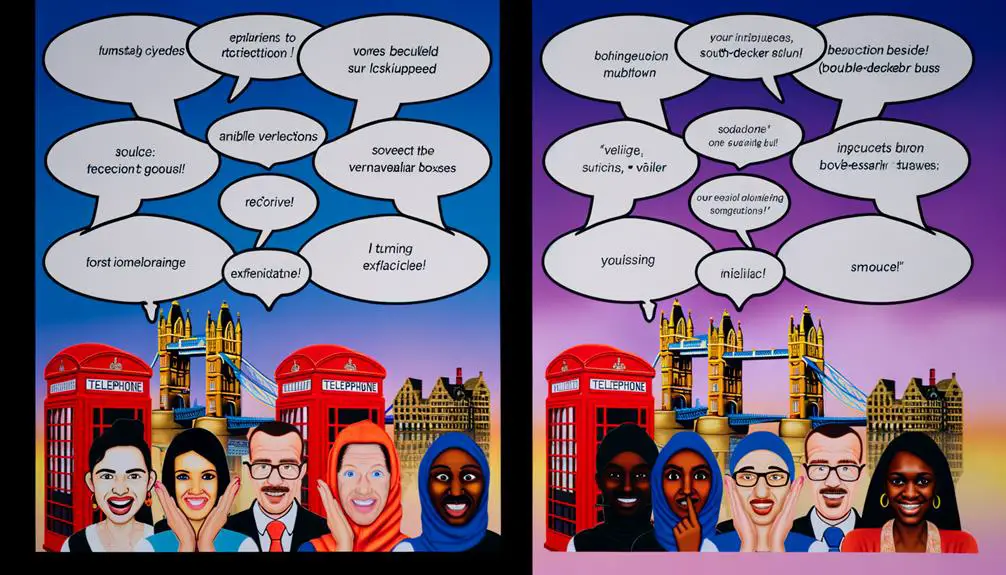In British slang, 'bussin' stands for something that's high quality or exceptionally pleasing, whether it's about food, experiences, or items. It's a term that originated from African American Vernacular English and found its way across the pond, adapting comfortably into British vernacular. Its usage is particularly popular among youth and heavily influenced by social media. The pronunciation and application can vary based on regional accents, showcasing the fluidity of language evolution across cultures. This term exemplifies the dynamic interplay between regional dialects and digital culture, enriching everyday vocabulary in the UK. Exploring further will reveal more nuances and applications.
Key Takeaways
- 'Bussin' in British slang means something is of high quality or exceptionally pleasing.
- It is widely used across various contexts, including food, experiences, and items.
- The term originates from African American Vernacular English and has been adopted into British vernacular.
- Pronunciation and usage can vary based on regional British accents.
- It has become popular among the youth and is frequently used on social media platforms.
The Origin of Bussin

The term 'bussin' has recently caught on in British slang, originating from the vibrant lexicon of African American Vernacular English where it's been used to describe something exceptionally good or enjoyable. This introduction into British vernacular showcases the fluid nature of language evolution, highlighting how linguistic elements traverse geographical and cultural boundaries. As you explore further into this phenomenon, you'll find that the adoption of 'bussin' within British slang isn't merely an act of linguistic borrowing; it's a demonstration of the dynamic interplay between regional dialects and the global digital culture that accelerates language evolution.
The journey of 'bussin' from African American communities to the streets of Britain exemplifies the mechanisms of language change in the digital age. Social media platforms and the internet at large have obliterated the traditional barriers to language spread, enabling terms like 'bussin' to gain traction far from their points of origin. This cross-pollination of regional dialects not only enriches the receiving language but also underscores the universality of linguistic innovation. Through this lens, the story of 'bussin''s migration is a fascinating chapter in the ongoing narrative of how languages influence each other in a connected world.
Bussin: Definition and Usage
In British slang, 'bussin'' signifies something that's exceptionally pleasing or of high quality, reflecting its roots in African American Vernacular English. You might find its usage spread across various contexts, from food that's delicious beyond words to an experience or item that's simply excellent. The term, with its vibrant energy, has nestled comfortably into British vernacular, especially among the youth and on social media platforms.
The bussin pronunciation and its regional differences add an intriguing layer to its usage. Depending on where you are in the UK, the intensity and delivery might slightly vary, highlighting the diversity within British English itself.
To give you a clearer picture, consider this table illustrating key aspects of 'bussin'' in British slang:
| Aspect | Details |
|---|---|
| Roots | African American Vernacular English |
| Meaning in British Slang | Exceptionally pleasing, high quality |
| Pronunciation Variance | Slight, based on regional accents |
| Common Usage Contexts | Food, experiences, items |
Understanding 'bussin'' in its entirety requires not just knowing its definition but also appreciating the cultural and regional nuances that influence its pronunciation and usage. This slang term exemplifies how language evolves and adapts, borrowing and reshaping meanings across different contexts and geographies.
Variations of Bussin in Slang

How does 'bussin' vary across different slang contexts, and what nuances does each variation introduce? The bussin etymology traces its roots back to African American Vernacular English (AAVE), where it's often used to describe something that's exceptionally good, especially in relation to food. However, as you venture into British slang, the term takes on different shades of meaning influenced by regional dialects. In some areas, 'bussin' might lean more towards describing an exciting or lively situation, diverging from its original food-related connotation.
The nuances introduced by these variations are significant. For instance, in London, 'bussin' might be employed among the youth to describe a piece of clothing or a party that is particularly stylish or enjoyable. Move up north or into other regions, and you'll find 'bussin' being used with a slightly altered emphasis, possibly leaning more towards describing an action or event as impressive or successful. Each regional dialect bends the interpretation and application of 'bussin,' showcasing the fluidity and adaptability of slang.
Understanding these variations requires not just a grasp of the term's etymology but also an appreciation of how local cultures and dialects shape language in real-time. This adaptability highlights the vibrant, ever-evolving nature of slang and its role in reflecting community identity and values across different areas.
How Bussin Fits in British Culture
Adapting from diverse regional dialects, 'bussin' seamlessly integrates into British culture, reflecting the dynamic evolution of language across communities. This term, though seemingly informal, finds its place even amidst the nuances of British politeness and the backdrop of cultural landmarks. It's a linguistic proof of the adaptability and inclusivity of language between historical richness and contemporary vibrancy, illustrating how modern expressions can coexist with traditional values without discord.
| Aspect | Influence on Culture | Example |
|---|---|---|
| Social Interactions | Enhances casual conversations | 'This tea is bussin!' |
| Cultural Events | Adds vibrancy to descriptions | 'The festival was bussin!' |
| Dining Experiences | Highlights culinary delights | 'That pie was bussin!' |
In the context of British culture, 'bussin' not only enriches the everyday vocabulary but also serves as a proof of the adaptability and inclusivity of the language. Its usage among different generations and communities signifies a collective embrace of evolving expressions, ensuring that language remains a living, breathing aspect of culture. By incorporating 'bussin' into conversations about food, events, and experiences near cultural landmarks or within social settings, it reinforces the dynamic interplay between language and lifestyle in the UK.
Bussin in Social Media and Music

You've likely noticed 'bussin' popping up across viral trends on social media, signaling its deep penetration into digital culture. Musicians are also incorporating 'bussin' into their lyrics and titles, showcasing the slang's crossover appeal. Additionally, various social platforms have adopted 'bussin' lingo, underlining its ubiquitous presence in online communication.
Bussins Viral Trends
In recent years, the term 'bussin' has exploded across social media and music, becoming a pivotal part of digital and pop culture lexicon. Specifically, bussin challenges have garnered significant attention, engaging users in creative and often humorous tests of taste, quality, or skill, all under the banner of what's considered 'bussin' or exceptionally good. Similarly, recipe adaptations have surged in popularity, with culinary enthusiasts and novices alike experimenting with traditional and innovative dishes, labeling them as 'bussin' when they meet or exceed expectations of flavor and satisfaction. These trends not only showcase the versatility and communal aspect of the term but also highlight its role in fostering a shared language and experience across diverse online communities.
Musicians Embrace Bussin
As musicians increasingly integrate the term 'bussin' into their lyrics and social media personas, they're not just adopting slang but are actively shaping its cultural significance and reach. This embrace of 'bussin' by artists across various genres underscores its versatility and appeal.
- Bussin collaborations have become a confirmation to the term's adaptability across different musical landscapes.
- Genre influences play a pivotal role in how 'bussin' is interpreted and woven into the fabric of contemporary music.
- Artists are pioneering unique expressions of 'bussin,' thereby enriching its connotations.
- The term's inclusion in music videos and promotional materials further cements its status within the pop culture lexicon.
Musicians are not merely users of slang; they are architects of its evolution.
Social Platforms Bussin Lingo
Exploring how 'bussin' permeates social media and music platforms reveals its significant impact on digital culture and communication. Its journey from TikTok origins to a widespread meme evolution underscores its influence. On TikTok, 'bussin' swiftly shifted from niche vernacular to mainstream slang, illustrating the platform's power in setting linguistic trends. The term's spread is a proof to how quickly a phrase can gain traction, moving beyond its initial context to become a staple in online dialogues and memes. This evolution is not just about the adoption of new words but reflects broader shifts in digital communication norms. Through meme culture, 'bussin' has become a marker of in-group knowledge, showcasing how social media shapes and expands contemporary language.
Comparing Bussin to Other Slang

When exploring 'bussin' in comparison to other British slang, you'll discover it occupies a unique niche in conveying enthusiasm or approval. Unlike many slang terms, 'bussin' has managed to carve out a distinct presence, especially when you delve into the nuances that set it apart. This includes the way regional differences and pronunciation nuances influence its use and perception.
To understand its unique position, consider these aspects:
- Regional differences: Unlike more universally understood slang, 'bussin''s impact can vary greatly across the UK. It's a reminder of how localized expressions enrich the tapestry of English slang.
- Pronunciation nuances: The way 'bussin' is pronounced can add layers of meaning or affect its reception, highlighting the importance of tone and context in British slang.
- Emotional impact: 'Bussin' often carries a stronger connotation of excitement or approval than its counterparts, making it a powerful tool in expressive communication.
- Cultural resonance: It resonates particularly well with younger demographics, aligning with cultural trends and social media usage.
This analysis underscores how 'bussin' not only reflects but also contributes to the dynamic evolution of slang, enriched by regional diversity and pronunciation subtleties.
Misunderstandings Around Bussin
When you come across the term 'bussin' in British slang, it's important to understand its cultural interpretation variance and be mindful of common usage mistakes. Misinterpretations can arise due to its flexible meanings across different contexts, leading to potential misunderstandings. Grasping these nuances guarantees you're using 'bussin' accurately in conversations, avoiding confusion.
Cultural Interpretation Variance
You'll find that the term 'bussin'' can lead to a variety of misunderstandings due to its distinct cultural interpretations. The linguistic evolution and regional adaptations of slang terms like 'bussin'' illuminate the dynamic nature of language, particularly within the informal lexicon. Despite its origins, as the term traverses different cultures, its meaning shifts, often causing confusion.
Consider the following aspects where interpretation varies:
- The original context versus new usage
- Local slang versus international understanding
- Age group differences in interpretation
- Social media's role in spreading regional slang globally
This variance underlines the importance of understanding the cultural backdrop from which slang terms emerge. Without this knowledge, you're likely to misinterpret the intended meaning, missing nuances specific to each community.
Common Usage Mistakes
Understanding the cultural origins of 'bussin'' is key to grasping its intended meaning, yet common usage mistakes still abound due to its varied interpretations across different contexts. You might find yourself struggling with the term, especially when maneuvering through the complex landscape of regional dialects and pronunciation differences within the UK. These nuances often lead to misunderstandings, as 'bussin'' may carry distinct connotations from one area to another. Additionally, the casual observer might overlook the subtleties in pronunciation that alter its meaning greatly. To use 'bussin'' correctly, it's vital to understand not only its definition but also the cultural and linguistic intricacies that influence its perception. Misapplying the term can easily lead to communication breakdowns, highlighting the importance of precision in language use.
The Future of Bussin in Slang

The future of 'bussin' in slang hinges on its ability to adapt and resonate with evolving cultural trends and linguistic innovations. As you explore the dynamics of slang, it's important to recognize how regional dialects and linguistic evolution play pivotal roles. The adaptability of 'bussin' will depend on several factors:
- Its integration into diverse regional dialects, enhancing its geographical spread.
- The role of digital platforms in accelerating its adoption and transformation.
- The influence of popular culture, particularly music and social media, in embedding it into everyday language.
- The natural cycle of slang, where words either solidify their place in the lexicon or fade away.
As slang constantly evolves, 'bussin' faces the challenge of staying relevant amidst the rapid turnover of colloquial terms. Its future will be shaped by its ability to remain expressive and resonate with the experiences and values of younger generations. The interplay between innovation in language use and the preservation of slang's core essence will determine whether 'bussin' endures or becomes a linguistic relic of its time. Analyzing its trajectory offers a fascinating glimpse into the fluid nature of language and cultural identity.







